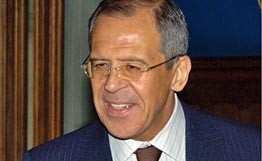Russia said Saturday it may be ready to remove its objections to the US-backed missile defence shield for Europe if it receives a formal security pledge from the United States.

The comments by Foreign Minister Sergei Lavrov suggest an easing of Moscow's position and precede a meeting between US President Barack Obama and his Russian counterpart on the sidelines of a May 26-27 G8 summit in France.
Lavrov said during talks with his German and Polish counterparts that missile defence talks with the United States and NATO were "progressing but slowly."
"We are proposing, and asking that it be put in writing, that the missile defence system for Europe is not directed against any of the participating states -- not NATO, Russia or other European states," said Lavorov.
"We are told there is no need to get this down in writing because this is inherently the case," he continued, speaking at a televised press-conference.
"But if it is inherently not aimed against Russia, why not write down that it is not aimed against any of the countries taking part in the talks?"
The nuanced language appears aimed at easing tensions between Washington and Moscow on the eve of the Group of Eight (G8) summit talks.
Russia has previously sought veto power in the system's operation -- a subject not breached by Lavrov.
Medvedev used a major television appearance this week to warn the United States that the two sides would re-enter a Cold War if Russia's missile defence concerns were not addressed.
But Lavrov said only that Moscow wanted to agree "a joint concept and architecture of a future European missile defence system."
"We hope that we will be able to resolve these issues -- at least at the expert level," he said.
Lavrov said Russia was also negotiating new language with the United States and NATO that would place limits on the number of interceptors the missile defence system can have.
Moscow fears that the shield could one day grow into an offensive weapon that targets Russian soil.
The United States counters that it is only helping to erect a defensive mechanism against potential threats from countries such as Iran.
























